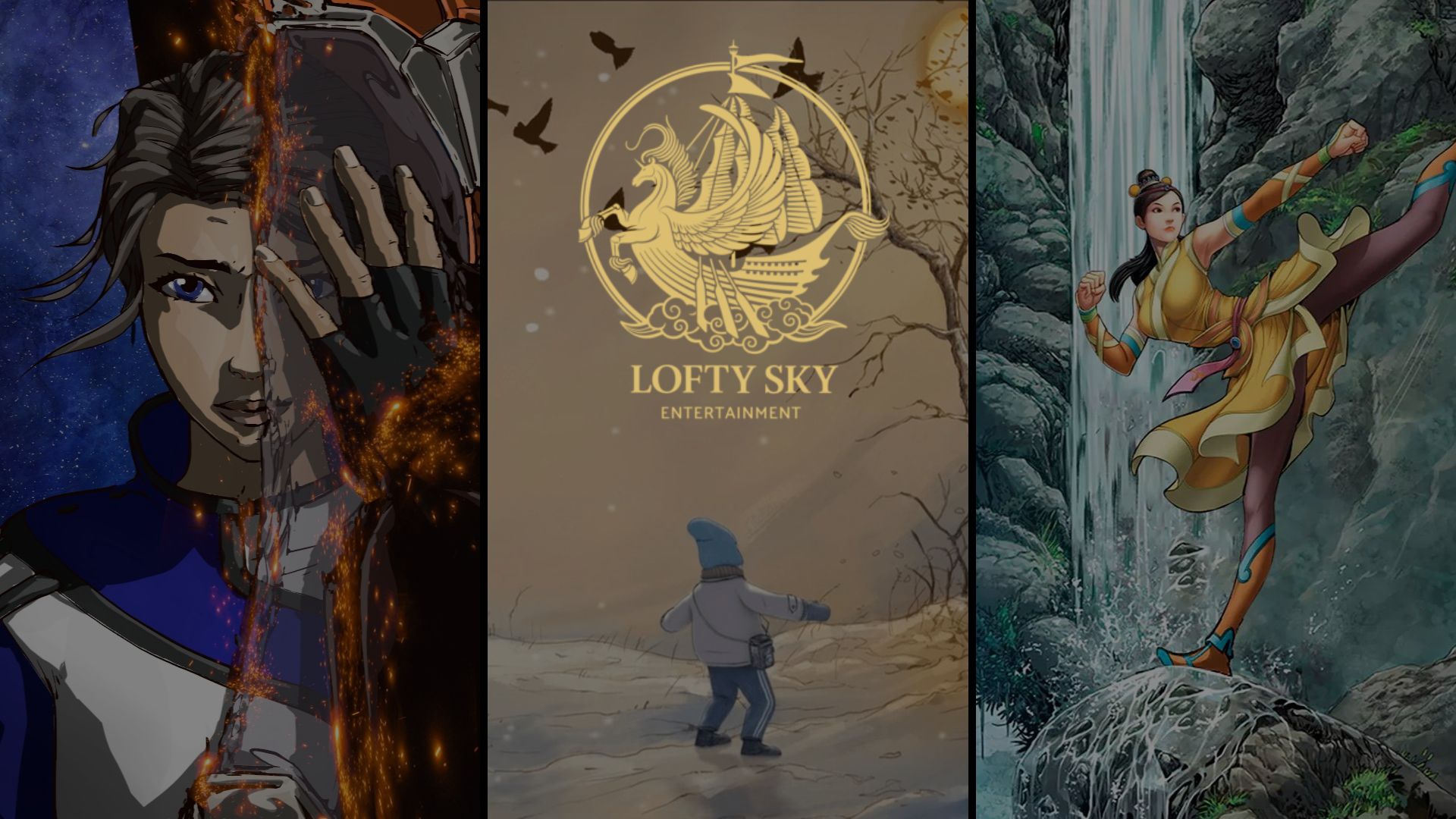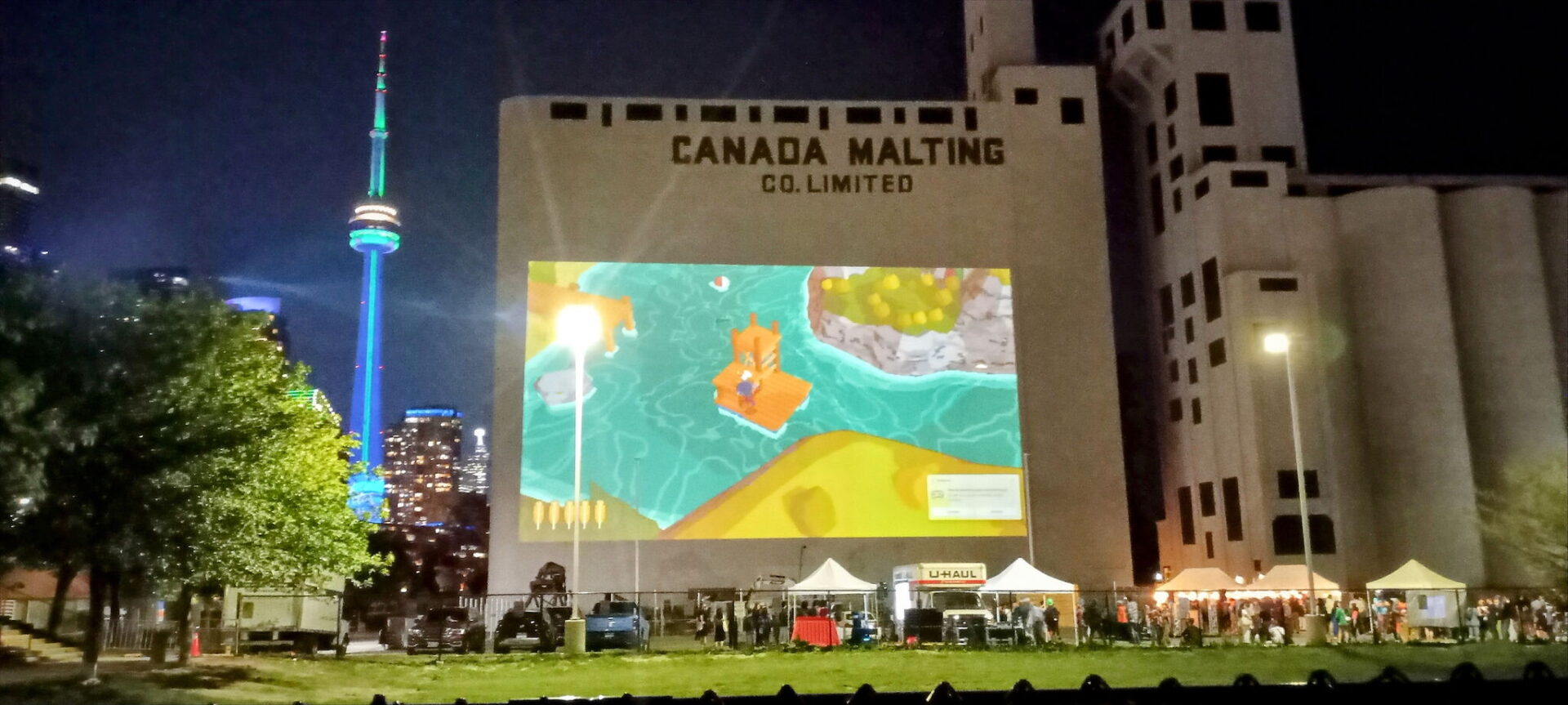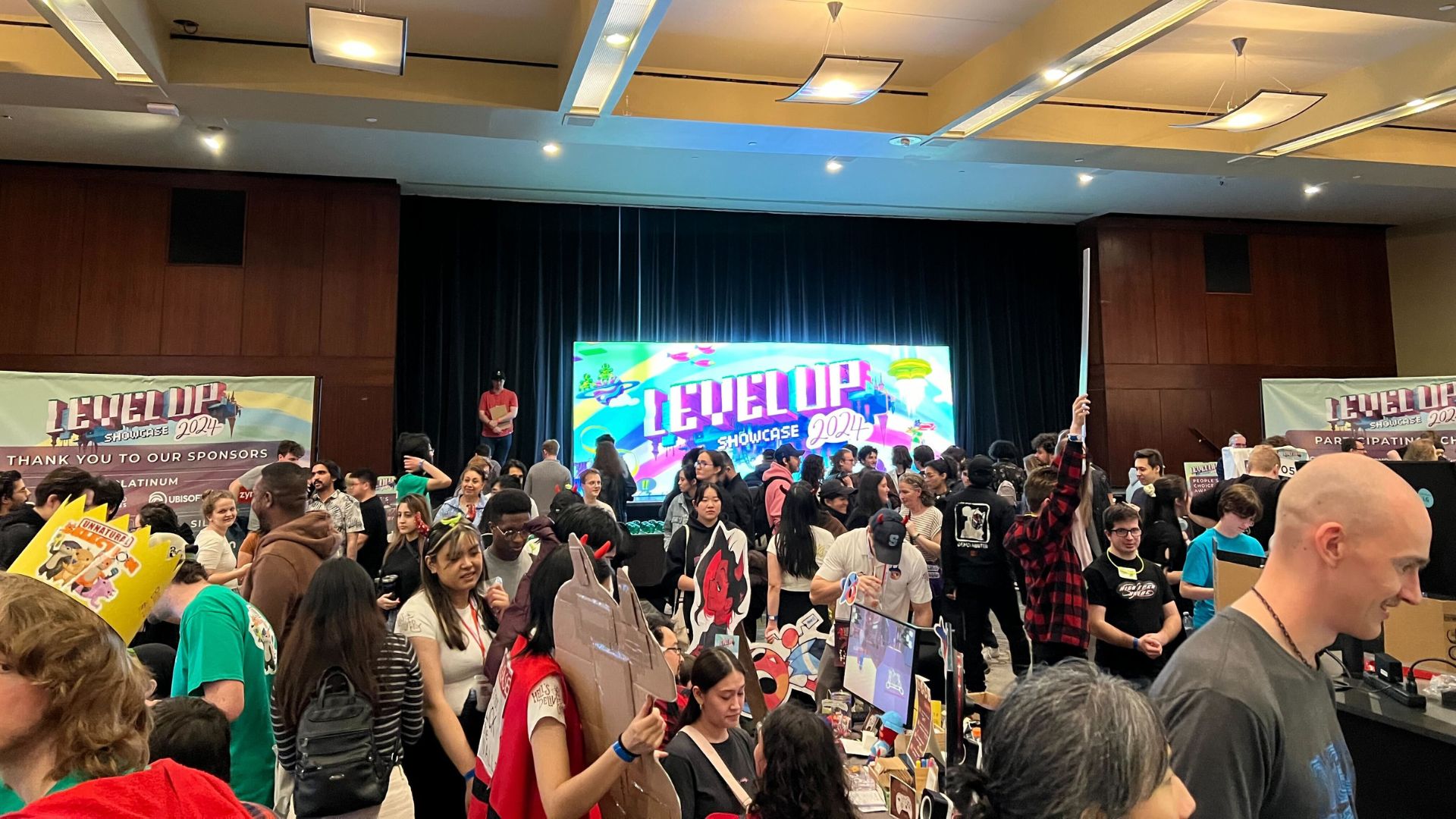Lofty Sky’s Jason Loftus and Judith Cheung: Telling Overlooked Stories Across All Media
Of the many talented teams in Ontario’s digital media community, Lofty Sky Entertainment is certainly one of the most versatile.
Rather than focus on any one medium, the Toronto-based company has divided its time between film (Eternal Spring, which was Canada’s official 2023 Oscars submission for Best International Feature), games (Shuyan Saga, a visual novel that aims to teach players about kung fu), apps (Miaomiao, which helps kids learn Mandarin) and more. Uniting all of the team’s projects, however, is a focus on providing entertainment while shining a light on often overlooked stories.
The Lodgge recently spoke with Jason Loftus, CEO and executive producer, and Judith Cheung, creative and marketing director, to discuss Lofty Sky’s cross-disciplinary approach to entertainment, the importance of telling underrepresented stories and what it’s like to be part of Ontario’s thriving media scene.
–
Part of what makes Lofty Sky so unique is that you tackle all kinds of media, not just games or film. What’s it like to go from one medium to the other? What are some of the key skills and lessons that you’ve learned that you take between each one?
Jason Loftus: I do think that there are challenges working across each medium. One of the things you learn is that each of them really has their own strengths – it lends itself to certain types of stories and experiences. But I also feel there’s a real asset when you’re able to do that – you come away from each experience or each product you create in a different medium and you just build your tool set. Oftentimes, when we work in one medium, we sort of silo ourselves and are restricted to the conventions that exist in that medium, but I think that there are things that we can learn and take with us that can help us be better creators and to approach things in different ways across mediums.
And I think one of the examples was with our feature film last year, Eternal Spring, which was Canada’s Oscar entry – that one was an animated documentary in a foreign language and it combined elements of different things that we had worked on […] So because the film was animated, even when the people were speaking in live-action, we had these Illustrated versions of their head shots that we had used in the concept phase and they appeared to help connect people with the actual character that they were seeing in animation and their name was there and the design was very much like what you would see with a character in a visual novel or an RPG where somebody’s head shot pops up and they start speaking. It was probably something that we had just developed because we’re working across different media that maybe not everyone who’s only working on documentaries would have thought of. So I think this is one of the sort of the examples of something that just becomes part of your toolset, and I think it makes you a better creator.
–
–
A lot of people often don’t understand gaming, especially if they’re outside of that space and may not view it as a “conventional” way of telling a story. From your perspective as someone who’s worked on all kinds of media, what are some of the benefits of creating a game?
Loftus: For us, what connects all of the different things that we work on even when we’re in a video game setting is that we’re storytellers. So even the games that we’re producing are very heavily narrative focused. But what I find with games is that it’s possible to immerse the audience even further because you’re not just empathizing with someone else through a screen – you take on the role of that character. And so it’s very important that when you think about game mechanics, there’s this added layer. If you want it to feel organic to the narrative, you need to think about what is a character trying to do in this setting and how does that tie to the mechanics? So hopefully, the player is feeling like it makes sense – logically, what they’re asked to do with the mechanics and all of that ties into the story and to the theme.
I think with Sky of Tides, which is our upcoming narrative game title that we’re producing right now, it works very well this way because the main character, Rin, is someone in this broken world. The planet has kind of exploded but mid in a stasis almost mid-explosion because the continents are now separate planetoids hovering in space […] But your father goes missing and so you’re looking for your father and you’re trying to understand as well your place in this world, what role you might have, and you’ll discover you have this kind of special role in order to be able to help heal this world. But all of that is an element of discovery and exploration, and so the exploration mechanic, that element of the gameplay, ties in very naturally. […] Games have that added element, but they also have an added challenge, which is you can visualize a story, you can write out a script, you can storyboard it, you can get a sense for how it’s going to feel, but when it comes to that gameplay component, you have ideas of things that might work but you need to build it and you need to also play it and make sure that it’s fun and you need to iterate on it. And so that’s sort of an added challenge.
Judith Cheung: Game design is more challenging, too, in respect to how devs are. It’s usually ‘one step forward and two steps back’ – like, you fix something but then it breaks. Whereas with film, it’s much more of a linear process where you can kind of see if it’s going to work or not. You’ve got audio, visual and maybe some text on screen, but with a game, you have so many things interacting with each other. So you might have addressed one thing but that could have broken everything else in the game. So I find the process with making a game is that it’s even more collaborative than working on a film in some regards as well.
–
That’s something I always try to emphasize to people, just how difficult games are to make.
Cheung: [laughs] It’s incredible that so many games get made, actually. [Loftus laughs] Because it’s so hard and that sometimes the devs will be stumped – ‘I didn’t do anything to the code but this thing’s broken now.’ So it’s just these little challenges. But like Jason said, it is really rewarding when it starts to all come together and it’s a fun experience and you can see it.
–
–
One of Lofty Sky’s mission statements is to focus on “overlooked stories” and “challenging subjects.” How do you discover and narrow those down, and why is it important for you to share them?
Loftus: I think a lot of it comes naturally. I was involved with other filmmakers as an executive producer earlier who had told a number of human rights stories and one of them, Human Harvest, was a Peabody Award-winning film about the illegal organ trading in China and how prisoners of conscience were being used in that organ trade. And I think being part of a project like that helps to build credibility. We have such a dynamic, vibrant Chinese community in Canada, and what you recognize is within that community, there’s a number of people – and not a small number of people – who come with them carrying remarkable stories of having endured repression or some kind of injustice and seeing that you’ve been a part of telling their story or sharing a story that has positively impacted and shown a light on some abuses – that helps to build trust.
It was interesting with Eternal Spring – that film came about really from a video game. It was Shuyan Saga, which was our last visual novel that had a kung fu combat mechanic roped into it – quite an interesting mix. And we found this artist [named Daxiong] who was living in New York at the time, originally from China, and he’d drawn for Justice League and Star Wars […] We learned why he had to leave his home and how it was connected with this persecuted group, Falun Gong, and how a group of them had been denounced in the media and thought, ‘We have to take over the airwaves to counteract this messaging.’ And even though he wasn’t involved in the TV hijacking, they had arrested thousands of people in the aftermath trying to find out who was involved and he had to flee his home. He’d briefly been detained and subjected to torture and then he ends up in our studio. For myself, it was just really shocking hearing the story, and for my wife, Masha, this is something that was happening under her nose in her own city [Changchun] and that she wasn’t aware of and the general public wasn’t aware of. And so, that is part of this motivation of wanting to tell these stories for the community, for the people themselves who have endured repression and abuse and injustice, but also for the general people in China who just, because of the censorship, have not been able to hear their fellow countrymen’s stories and what they have endured.
[…] And what we found in the game space is that so many of our audience, especially in the younger demographic, are people who want to have a positive social impact in the world. They want to be aware of what’s going on. They want to positively influence the world around them. And they don’t just need to be entertained and that’s it. They want to be citizens who are bringing positive impacts to the people around them in the world around them, so we felt it was just a natural fit to try and bring in some of the work that we had done in documentary and impact documentary, specifically, with the narrative game work we’re doing.
–
Your next game before that, Sky of Tides – you talked about it a little bit. Within that framework of overlooked stories and challenging subjects, what were some ideas, themes and kinds of characters you wanted to explore in the game?
Judith Cheung: We wanted to explore this concept of having traditional ways, looking back to the past and the ancients and looking at the value in all of that wisdom, and maybe that might be a solution as the path forward for a planet to heal itself and come together. So there’s this one faction called The Sovereign which is very much reliant on that. These people are more spiritual, they believe more in tradition and living in harmony with their planet, whereas on the other side is The Syndicate, which is very much more an authoritarian regime, and they have heavily relied on a very destructive technology called Corron which is very powerful. But at the same time, it’s killing the planet and they’re holding the planet hostage because they want to have control so they control the technology, which in the end, controls the food.
And there’s just some interesting parallels to our world. I’m the creative director, but the creator, Lina Skorbach – she’s not with the company anymore – but I think it’s interesting, she’s from Ukraine and her family survived communism and things like that. So I think that perspective coloured her views of the world that she was able to bring that into a game.
Jason Loftus: I think it’s interesting to think about both sides of that and that’s what this opportunity, what this conflict of two sides vying with different perspectives, allows us to explore and to look at. And at the same time, as technology takes over and this is what you see in this world, there’s a lot more elements of uniformity – everybody’s the same. There’s so much richness and diversity that exists in different places and sometimes the ability to have everybody connected is beneficial but also, you don’t want to lose the diversity and the richness of different cultures and different backgrounds and make everybody think and look the same. So I think this is also something that’s there beneath the surface. There is really an appreciation for each of these individual worlds and each of them has their own unique trait, so they’re all part of this solution.
Something interesting I think in the mechanics [of Sky of Tides]: there are five different character traits but in contrast to a lot of other RPGs where you’re like ‘I’m gonna zero in on my intelligence and see what that does to shape the narrative,’ this world is broken and it’s divided and so Rin, the main character, benefits from actually creating balance. What you’ll find is that when you’re able to reach thresholds in all of your different character traits, that will open up new opportunities for you. It unlocks new objects. You get bonuses. It will unlock different dialogue options and different things that you could not otherwise do. So the goal there, instead of having one experience that’s maybe extreme in a certain trait and lacking in others, is about creating some kind of balance.
And that speaks to this sort of the theme of the whole experience, which is that it is a divided world, it is a broken world, it’s out of balance and maybe there’s strength to appreciating different sides of things and also different virtues or different sort of qualities instead of just zeroing in on one and this is the ‘be all, end all’ in a sort of binary perspective.
–
–
You produce so many different kinds of projects. How have provincial funding opportunities like Ontario Creates and the Interactive Digital Media Tax Credit aided you across your portfolio?
Jason Loftus: They’ve been instrumental in a number of projects. The project funding has been super helpful. Ontario has been made up of a lot more of smaller studios. I know that Quebec started earlier with some of the offices of the large sort of international players and Ontario was initially sort of catching up and it’s created this ecosystem of a lot of studios that are independent and doing their own things, and having that funding source that helps you to fill in that piece of your financing, you feel like you get a certain percentage of the way to making something work and then them coming in and being able to help close that cap – it’s been super helpful. They’ve been consistent with what they’re doing which makes it easier to sort of bankroll when they do invest in a project. Funders or lenders will recognize more often their participation. Then there’s this complete sort of 360 perspective in what they do as well. They understand that it isn’t just like, ‘Here’s some money, make something.’
It’s like ‘How do you help the studios to develop, to be exposed to the opportunities to pitch their games to meet market partners?’ And there are barriers to those things as well. Because oftentimes, so much of it is focused just on getting something funded but you need to do something with that funding. Once you have a game, you need to get it out in the world. And so, the opportunities that they do by participation in GDC [Game Developers Conference], Gamescom, supporting different market events, and helping to connect studios with opportunities – those have been really wonderful as well in helping to build.
Because ultimately, the studios need to not just have funds to create their games, they need to build those relationships with the publishers. They need to develop. And so they’ve been helpful to us in different ways right from the beginning as we’ve grown and we have developed those relationships and we’re really pleased to land a good publishing partner for our last title after winning GDC Pitch with Sky of Tides, and we’re really looking forward to working with that partner. And that’s something that you come across, these partners, because you’re able to participate in these events. And we got into GDC Pitch through Interactive Ontario, their booth participation.
Chung: Because they’re part of GDC Play. [This is an interactive platform for indie developers to demo their projects and connect with industry professionals].
Loftus: Yeah, we ended up being one of the handful of studios from around the world. It was picked to participate in GDC Pitch and that opportunity all happened because Ontario Creates was part of GDC Play and was giving studios that opportunity to have smaller-scale participation in GDC Play without having to go out and just buy the booth themselves. And that worked for us as well, because a lot of times when we’re there, we’re a small team. We’re not focused necessarily on just having a booth and sitting there and manning it with staff all the time. We’re out there meeting with publishers trying to develop our business. And so that gave us a slot we participated in for a couple of hours, but then we got into Pitch and everything came from that. They’ve been very helpful in a number of ways and I think they play a really important role in the industry here.
–
For Lofty Sky, what’s it like being in Toronto creator community and what makes it so special?
Loftus: Yeah, there’s a number of studios [here] and part of it has been through Interactive Ontario, actually, because you have goals and similar concerns and so you connect with other studios through the industry trade body and that helps you to build relationships. And then through that, you naturally see people that develop their companies, you see them grow over time. And there’s a number of Ontario studios that we’ve seen through Interactive Ontario that have been around for quite a number of years now and it’s been wonderful to see them grow and develop their business. It’s inspiring – you’re inspired by other people around you who are doing things. A lot of times when it comes to actual work, the digital media industry overall is so diverse – there’s so many different types of games.
And even with us, we end up collaborating with a different people, but very often it’s within our forte, our own focus. And so you don’t necessarily collaborate on projects with other studios in the area, but you’ll see them at a showcase or you’ll see them, very often, overseas. You’ll see them in Cologne [for Gamescom in Germany] or you’ll see them in San Francisco [for GDC]. and so that’s when you catch up and you see what other people are working on. And it’s great to have that – you feel like you’re part of a team and again, it’s the Ontario Creates of the world and such and Interactive Ontario who’s helping, even when we are overseas, to find opportunities for people to get together, kind of networking events, and oftentimes, there will be studios and people I don’t see unless I’m at an Interactive Ontario event or I’m overseas and there’s some function or whatnot. But it’s wonderful and it’s inspiring to see people chart their own path and to be able to share with them what you’re working on as well.
–
Eternal Spring VR is now available on the Meta Store. A release date has not yet been confirmed for Sky of Tides, but a free demo is available on Steam. The game will also launch on PlayStation 4 and 5, Xbox One, Xbox Series X/S, Nintendo Switch and the Epic Games Store. An animated tie-in series called Sky of Tides: Atla is also in the works.
Follow Lofty Sky on X (Lofty Sky Docs/Lofty Sky Games), TikTok, Instagram (Lofty Sky Docs/Lofty Sky Games) and Facebook (Lofty Sky Docs/Lofty Sky Games).
–
–
Contributed By
Will Perkins
Principal and Creative Director at CONTINUE






